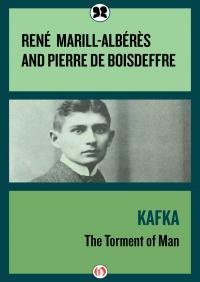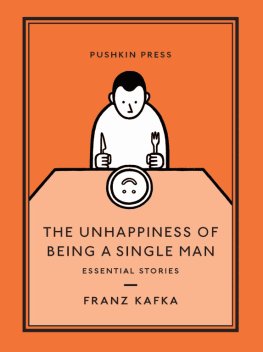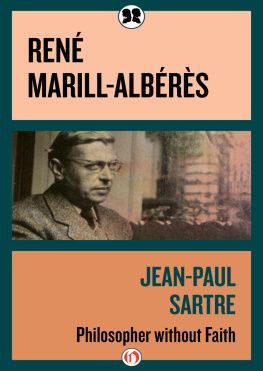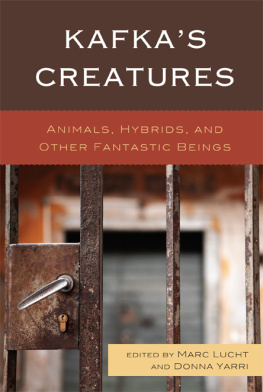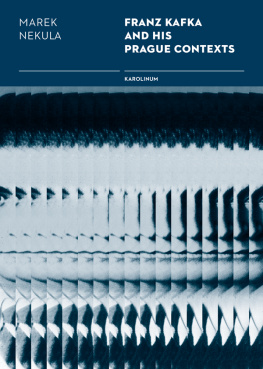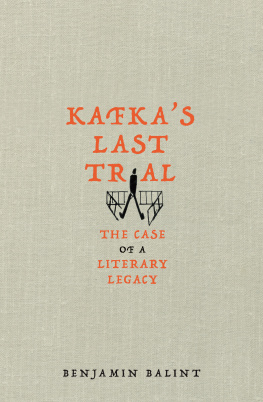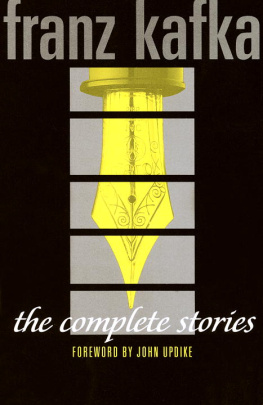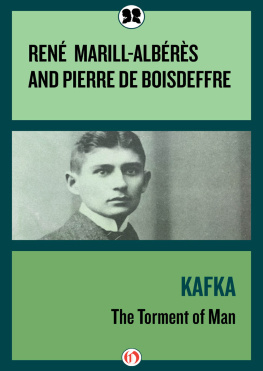Kafka
The Torment of Man
Ren M. Albrs and Pierre de Boisdeffre
With an Introduction by Margaret C. ORiley
Translated by Wade Baskin

CONTENTS
Introduction by Margaret C. ORiley
Translators Foreword
I. Birth and Development of GeniusKafka before Kafka (1883-1913)
II. Kafkas TormentThe Post-Naturalist Generation (1906-1913)
III. Kafka and the Prospect of Marriage (1912-1921)
IV. The Burrow of the Individual and the Labyrinth of Men
V. The SurvivorLoneliness, Creation, and the Prospect of DeathThe Last Love AffairSickness, Death, and Survival (1921-1924)
VI. From Allegory to LegendMyths and Influence of Kafka
Chronology of Important Dates
Bibliography
INTRODUCTION
During his lifetime Franz Kafka remained almost utterly unknown. Max Brod writes that after his friends death it was not easy to find an important publisher who would undertake to bring out a posthumous edition of Kafkas work. Gerhart Hauptmann, a publisher to whom Brod appealed for help, had never heard of Kafka.
Todayforty-two years since Kafkas deaththe picture is radically changed. The literary world has deep interest in Franz Kafka, the artist described by Claude Mauriac as this very sick man, stricken in both mind and body who personifies the imbalance of our time. Today almost all literary reviews, whether English or American, French or German, reflect this interest. All of Kafkas writings are available in English as well as Max Brods Franz Kafka, a Biography.
As Max Brod has noted, Now that the personality of Kafka has more or less entered the common domain, we are faced with the inevitable distortions of his image. Time onlywith its production of many portraitures of Kafka, the man and the artistwill allow the true image of this complex figure to emerge. The reader who desires to know that true image, to understand the imbalance of our time, and to see how Kafka personifies it, will welcome this biography written by two well-known French critics, R. M. Albrs and Pierre de Boisdeffre and translated by Dr. Wade Baskin.
The singular value of Kafka: The Torment of Man is that it points out not only the strength of Kafkas writing but also the profound insights therein. Today many voices, beginning with Becketts, say the authors, seem to be echoes of his voice. With Kafka the writer begins to descend from the regions ruled by power and glory to those in which he is besieged by uncertainty, anguish, and humiliation. This prophetic quality was seen, too, by Walter Kaufmann, who has described Kafka as standing between Nietzsche and the existentialists, as picturing the world into which Heideggers man, in Sein und Zeit is thrown, the godless world of Sartre, the absurd world of Camus.
Kafka, who in 1906 received his doctorate in Jurisprudence, and who worked first in a private insurance company and then at a semigovernmental post in Prague, never looked upon literature as a career, but it was basic to his life. As Albrs and de Boisdeffre say, to Kafka it was a religion. He said again and again, I am nothing except literature. His writinghis literaturewas bound word for word to his life. Elements of autobiography, according to those who knew him, rather obviously abound in his work. In his Diaries he wrote: At this moment I have a great need to root out my anxiety by describing it completely, and as it comes from the depths of my being to transfer it to the depths of the paper. This moment for Kafka was a lifetime.
Thus to know Kafka one studies biographical facts side by side with such singular productions as The Metamorphosis, The Great Wall of China, In the Penal Colony, The Trial, and The Castle. In theseand in the other works of this Jew, whose mother tongue was Germanthe strange fascination lies in the fact that if Kafka, as Philip Rahv suggests, arouses in us a sense of immediate relatedness, of strong even if uneasy identification, it is because of the profound quality of his feeling for the experience of human loss, estrangement, guilt and anxietyan experience increasingly dominant in the modern age.
The problemone of estrangement, guilt and anxietywith which all Kafkas work is concerned is a moral and spiritual one. This Edwin Muir has noted in his introduction to The Great Wall of China and he remarks further: It is a twofold problem: that of finding ones true vocation, ones true place, whatever it may be, in the community; and that of acting in accordance with the will of heavenly powers.
In imaginatively presenting this problemhis own and one that has become crucial in the culture of our timeKafka has produced a body of work in which negative elements seem to abound, but in which, too, there remains a consuming yearning for the truth. Harry Slochower in The Use of Myth in Kafka and Mann says, He does not end in a Kierkegaardian either/or, and he does not end with submission or surrender. The quest in Kafka is also an inevitable and persisting feature of mans way. In its persistence lies the promise of the quest.
In this literature of quest, of seeking, certainly no problem is solved, no satisfactory answer to mans plight is offered. Edwin Muir has correctly observed, The greatness of Kafka lies not in his having solved the problem, which would be absurd, but rather in his having realised it as it has never been realised before, illuminating it with a power of imagination and thought unexampled in his time.
Margaret C. ORiley, Ph. D.
Southeastern State College
TRANSLATORS FOREWORD
Translating this remarkably insightful essay on one of the most intriguing writers of the twentieth century has truly been a labor of love. It is regrettable that Franz Kafka is frequently introduced to readers in such a way as to discourage all but the boldest, and I was pleased to find that two of the most eminent critics of contemporary literature have done much to correct the shortcomings of their predecessors. This brief essay exemplifies the traditional French virtues of clearness, simplicity, and sound judgment. In all likelihood, the reader who reads past this foreword will be encouraged or compelled to re-examine the writings of Kafka in the light of the ideas and insights presented in the essay. It is altogether fitting that the essay should have been co-authored by critics already distinguished by their studies in contemporary literature: R. M. Albrs, author of philosophical and literary studies including works on Jean-Paul Sartre and Miguel de Unamuno; and Pierre de Boisdeffre, a novelist in his own right, author of many critical studies, and the editor of a French Dictionary of Contemporary Literature.
I would like here to acknowledge my indebtedness to those who have helped me to prepare this translation. I am indebted to Miss Gayle Ann Brown and Mrs. Nelda Wade for their help in compiling the appended bibliography. For their assistance in checking various details, I am indebted to Dr. Donald Brown, Mr. Gene Franks, Mme. Nicole Hatfield, Mrs. Mary Frye, M. Dominique Penot, Miss Mildred Riling and Dr. Hans Schmitt. For the shortcomings which persist despite their contributions, I alone am responsible.
W. B.
I
BIRTH AND DEVELOPMENT OF GENIUS
KAFKA BEFORE KAFKA
(1883-1913)
At the outset, Kafka seemed to be a completely normal young man.1
It would be tempting for us to approach the work of Kafka without stopping to examine the circumstances surrounding his birth. Indeed, many critics today claim that only the
Next page
